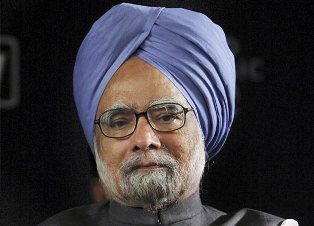The government’s decision to allow 51 percent foreign investment in multi-brand retail outlets, and cent percent in the single brand ones, may prove to be as much of a game changer as the nuclear deal.
If the deal was a momentous development because of the international community’s unprecedented acceptance of India as a nuclear power, although it hasn’t signed the non-proliferation treaty, the opening up of the retail sector marks the start of the long-awaited second generation reforms, which can give a fresh boost to the economy.

But, just as the nuclear deal saw the government reject the Nehruvian paradigm of non-alignment by moving close to US, similarly, the latest step in economic reforms heralds an unmistakable departure from another Nehruvian shibboleth – establishing a socialistic pattern of society, as enunciated by the Congress in 1955.
It is noteworthy that both these definitive breaks with the party’s own past is the handiwork of Manmohan Singh, an unassuming prime minister who, as Amartya Sen once noted, is incapable of raising his voice. Yet, few will deny that this architect of India’s economic buoyancy has raised India’s profile in the international arena, where an Indian passport holder today is treated with respect in foreign airports.
In contrast to the courage shown by the prime minister and the party in charting a new course, the opposition has again exposed itself as comprising opportunistic curmudgeons with a blinkered outlook who are unable to come to terms with a changing world.
What is strange is that while the Left’s dogmatic obduracy can explain its rejection of both the nuclear deal and foreign direct investment (FDI) in retail, the right-wing Bharatiya Janata Party’s (BJP) unwritten alliance with the comrades on both the issues is inexplicable. That the BJP’s leftward slide has nothing to do with ideology was evident from leader L.K. Advani’s assurance to US diplomats, as revealed by Wikileaks, that the party would accept the nuclear deal if it came to power.
It was obviously unadulterated opportunism which guided the BJP then as it is doing now. In following this cynical path, the party is apparently willing to alienate its own middle class base again, as it did on the nuclear issue. But, it neither has the broadness of vision to see that both these measures open up immense potentials for the country, nor the generosity of mind to support the Congress. Instead, it has chosen to make unremitting cussedness the cornerstone of its outlook.
If some of the other parties, including the Congress’s allies like the Trinamool Congress and DMK, have displayed similar purblind stubbornness, the reason is their limited vision, which is confined to the political compulsions of their respective states, and an inability to comprehend the economic implications of a step which will take several years to make an impact.
The Trinamool Congress’s fear is that the Communists, its main opponents in West Bengal, will accuse it of meekly acquiescing in the centre’s “anti-people” and pro-capitalist policies while the scam-tainted DMK, under an aging patriarch and his squabbling sons, does not seem to have either the energy or an adequate intellectual grasp of the subject to define either its objections or its support.
There is also probably a socialistic streak in its outlook, which is a common feature of most Indian parties because they have been reared in an atmosphere of anti-British and anti-American imperialism and a Gandhian preference for swadeshi or nationalism.
It is this mindset which has made the crusader against corruption Anna Hazare, who has been described by well-known political scientist Ashis Nandy, as a well-meaning, “if slightly dumb”, neighbourhood elder, to evoke the machinations of the East India Company of the 17th century to take over India via trade.
Then, there are others like Uttar Pradesh Chief Minister Mayawati, who has described the giant multinational retailers as the foreign “friends” of Rahul Gandhi to draw attention to the Congress heir-apparent’s foreignness and thereby undercut his electoral challenge, evidently because she is more wary of him than of any other opponent during the forthcoming state assembly elections.
It is these unthinking, knee-jerk responses of the opposition parties which explain why, at the end of the day, the Congress almost invariably comes out on top. While the others adhere to hackneyed, outdated ideas with an eye on immediate gains, the Congress, despite the charges of corruption and vote-bank expediency, does have the broad picture of national advancement in mind. And if anyone deserves to be congratulated on this account, it is Manmohan Singh, the reformer. After a period in the political badlands, he is back.
Amulya Ganguli is a political analyst.
IANS


